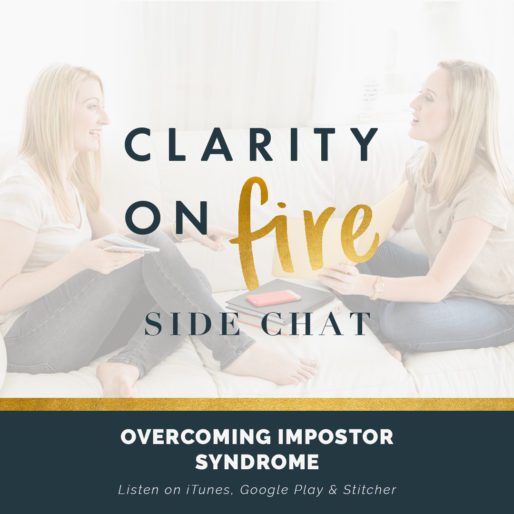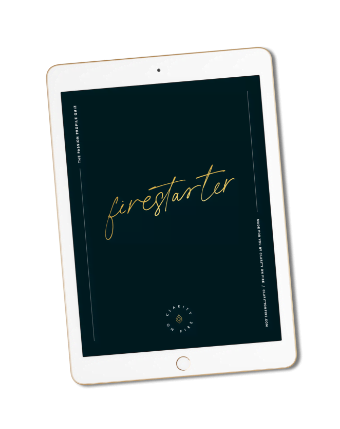Click the play button below, or subscribe and listen through our podcast on iTunes, Stitcher, or Google Play.
Podcast: Play in new window | Download
Do you remember that scene in E.T. when he (E.T., that is) shuffles out of a closet wearing a dress, high heels, a blonde wig, and a little bowler hat?
Yeah, I didn’t really remember it either, until Rachel brought it up.
She was using that very vivid mental picture (you should really Google “E.T. in a wig” if you want a good laugh) to describe how she’s always felt about dating — she’s E.T. in a wig, and everyone else is a tan, gleaming contestant on the Bachelor.
Obviously this made me LOL. Not only because it’s a hilarious analogy, but because from the outside, it’s patently ridiculous. Of course she’s not a weird alien, trying and failing miserably to perform a common human ritual (dating).
But as dubious as it sounds to me, it feels true to HER, and that’s what impostor syndrome is all about: You’re constantly afraid that you’re going to be “found out” as the fraud you fear you “truly” are, regardless of how silly or illogical it seems on the outside.
In this Magic 8-Ball episode from July 2018, we dived in to impostor syndrome and how to overcome it. We covered…
- Where impostor syndrome comes from, and why it’s so sneaky (hint: it’s because everyone has it, but no one’s willing to talk about it).
- Why high achievers and intelligent people are actually the MOST likely to suffer from it.
- Why impostor syndrome tends to go hand-in-hand with the feeling that something came “too easily” to us.
- How to tell if you’re experiencing impostor syndrome, versus when you might ACTUALLY be an impostor.
- Plus, I coached Rachel on the fly about her impostor syndrome, and we got to the bottom of what’s going on.
Leave a comment below after you’ve listened to share your own experiences with impostor syndrome!
LISTEN TO THESE EPISODES NEXT
Bring your own butterbeer: Kristen interviews Rachel on her 30th birthday! (August 2018)
Side Chat: Are you copping out? Or letting yourself off the hook? (April 2020)
Magic 8-Ball: The grief of transitions (April 2020)
GET TEXTS FROM CLARITY ON FIRE!
Want to get weekly texts from us? Sign up here, OR … text your first name followed by your email address (Example: Hermione [email protected]) to 703-783-3223.




I love this whole idea. I’ve had this feeling multiple times. I tried online dating and it completely goes against my personality and every time I went to meet someone it just felt wrong and inauthentic. And then in so many of my jobs where I know I just don’t belong and like you mentioned- just don’t care enough to learn more and really be great at it. I would do the minimum and would just feel drained. As for feeling it where it didn’t belong- sometimes through my blog I feel like I’m not good enough or have anything worth saying to even have it sometimes, even though I’m reassured pretty regularly that I’m doing a really good job with it. I’ll keep at it because I love writing but it’s a constant struggle with feeling like I’m good enough. Great podcast!
Hey Natalie! I’m glad that you’ve had experiences with both the “real” impostor feelings (AKA, just not caring that much) and “false” impostor feelings (AKA, being perfectly acceptable but believing you’re less-than). When you’ve had both experiences, it becomes easier to identify what’s what! If you need it, here’s a big fat permission slip to not do anything that feels wrong, inauthentic, and goes against your personality, and to keep doing the things that you enjoy and are good at, even when you doubt yourself. 🙂
The part about not wanting to get kicked out of the tribe and your lizard brain protecting you reminded me of something I read about a Neanderthal called Shanidar 1 who was found to have several severe deformities, hearing loss, head trauma, etc. sustained early in his life. But he lived to be really old in caveman years because his tribe took care of him, which shows that even Neanderthals didn’t give up on people who couldn’t contribute. So that’s one way I shut up my lizard brain when it’s telling me people will throw me to the wolves if they find out I’m an impostor – “Neanderthals didn’t, and if these people are worse than that, I don’t want to be friends with them anyway.”
That is such a cool–and funny!–way to respond to your gremlin, Grace! I’m definitely going to share that with people. It’s a great perspective shift! 🙂
So I’m going to be vulnerable and say that the one place I feel most like an impostor is at work and everything that it involves. I’m prepping for a huge test that I know I have the ability to pass, but because I feel like I don’t belong in the field of engineering, it makes it like it is an impossible task. My friends in engineering have told me multiple times that I am more than capable, that my 11 years of experience and all of the compliments that I get from clients show that. But I feel like most days I can’t shake the impostor feeling.
Now that I have actually admitted it, I’m going to try to see if I can break through it. But I have to say this side chat finally helped me to admit my feelings.
Thank you for being honest and brave and sharing how you feel, Jen! I’m curious whether you resonated more with our description at the end of REAL impostor syndrome (AKA, I’m really meant to do this, but my inner critic tries to put me down and convince me I’m not enough) versus “fake” impostor syndrome (AKA, you don’t really need or want to be doing it, you should feel like you “should,” and then feel like a fake because you just can’t make the wrong thing work).
The Ultimate Impostor…Rachel/Kristen, I’ve been struggling with this idiot, demon (impostor syndrome), in my head for the last year or so. May 2019, I completed my PhD in psychology. I’ve NEVER been the brightest kid in the class, though I’ve enjoyed a few successful careers (retired Navy, successful business thought leader in the multiple sclerosis community), and despite these successes when I completed my doctors degree this insidious, self talking-ET cross-dresser became louder (LOL) in my head. How I’m pushing through my negative self-talk is by “practicing what I preach”…meaning, I broach my own self-care of the syndrome by using the same tools I would use to help my clients get through their stuff (for myself)…Wherein I know impostor syndrome is in my head NOT my heart. Bless you all
Thank you for sharing that! I think a lot of people assume that getting a higher degree like a PhD means you MUST have ascended beyond the realm of impostor syndrome. But no, you take it with you wherever you go! And funnily/annoyingly enough, the more success you have the louder it can get, because the more failure it perceives is possible. Love that you’re using the tools you give to your clients on yourself!
This one came up again for me at literally the perfect time. I have been in commercial real estate for 3.5 years now and I consistently have bouts of imposter syndrome when it comes to my job. Just when I’ve hit my stride and am feeling good in my role, like I’m learning, growing and I’m creating value, something happens and I find myself taking 2 steps backwards. I go through weeks of self doubt, low confidence/esteem and keep asking myself if I’m really cut of For this type of work or if I’ll ever grow past the point I’m at today. While I’m all about feedback and learning where I can improve, I can’t help but notice a pattern of being treated differently than my colleagues. When does feedback stop being constructive? Am I an imposter and people are figuring it out or am I being pushed out? I like what I do, or at least I thought I did…
That’s a great question, Alexandra! I might flag it for our next episode of Dear Krachel, if you’re cool with that. 🙂 My first bit of feedback is: Don’t doubt what you sense. If it feels like you’re being treated differently than your colleagues, don’t try to convince yourself that’s not true. Let’s give yourself the benefit of the doubt! And as to when feedback stops being constructive, I interestingly had a conversation about this VERY thing yesterday with our normal person for August (so check that out on the 14th). She said something like, “You’ve got to step back and ask yourself whether they’re advocating more for who they THINK you are/want you to be, or whether they’re advocating for who you REALLY are.” The intention behind the feedback means everything!
Totally flag it for Dear Krachel! There’s so much more I could say about this subject and women in business. BUT I think you’re spot on, I need to trust my gut. I also love the perspective of thinking about the motivation behind the feedback. I’ve always been the person to find the good in people/situations. But what if the motivations don’t always have favorable or good intentions? It’s a delicate balance of maintaining professionalism and putting my foot down.
For sure! I think it’s totally valid to examine things from a place of looking for the good in people/situations. AND, it also doesn’t hurt to practice the opposite (especially if you tend toward giving people the benefit of the doubt too often). Which doesn’t mean you should become suspicious and cagey, but you can definitely experiment with asking, “OK, and what if this person DIDN’T have the best motivation here [maybe they have a self-centered motivation or they’re oblivious to who I am and what I need]? What then?”
This episode I definitely felt like I could relate to a 100%. I deal with the imposter syndrome as a fashion designer and illustrator. It comes easily to me especially fashion illustration that I feel I’m a fraud. It took a while for me to even charge for my services and I still deal with not feeling good enough. Everytime I make a dress for someone I dread them trying it on and funny thing is they are always happy with what I make so I don’t know why I feel that way.
That’s totally understandable, Melissa! I’m glad you’re discovering that this isn’t just a “you” thing. We all feel like this, especially about our areas of expertise, ironically enough. The fact that everyone who experiences your work loves it speaks to how false those impostor thoughts are!